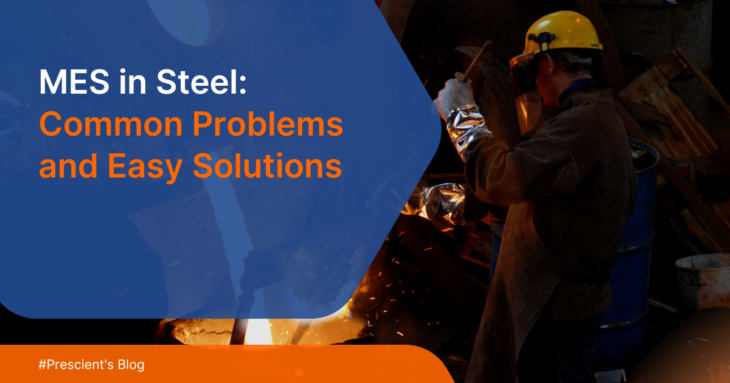Key Challenges and Solutions for MES Implementation in the Steel Industry
- Home
- Blog Details

- December 20 2024
- systemadmin
Manufacturing Execution Systems (MES) systems have a proven record of improving manufacturing and production processes across various industries. It adds a bridge between higher planning and management layers to the everyday operations on the shop floor. The benefits of implementation of MES systems also come with challenges as it involves many departments and systems throughout the industry. However, implementing an MES in the steel industry isn’t just about adopting new technology. It’s also about navigating a complex web of challenges unique to this industry. Being one of the oldest industries around, it comes with challenges that can be broadly classified, as we discuss further in this article.
Table of Contents
ToggleThe Key Challenges for MES Implementation in the Steel Industry

Let’s understand the key challenges in detail below:
1. Challenge: Strategy and Stakeholder Alignment
One of the biggest MES implementation challenges in steel is getting everyone on the same page about the project. If the strategy to implement the MES system isn’t clear from the start, confusion is almost guaranteed. Therefore it’s crucial to clearly define what MES for the steel factory will achieve and align it with business objectives so it meets customer needs. But it doesn’t stop there, as getting the stakeholders onboard can be tricky. Getting everyone from the top-level management to the employees and suppliers on board is crucial. Without their acceptance there is a risk of facing resistance, conflicts, or even project failure.
Solution: The key to success is strong communication and a well-defined plan. Start by clearly outlining the goals and benefits of MES for the plant. The outcome of implementation needs to align with the manufacturer’s business strategy and not have too much deviation. It’s important to involve all stakeholders in the decision-making process from the start. Engage them in the process by listening to their concerns and demonstrating how MES will make their work easier. By being transparent, it’s possible to progress with the full support of everyone involved.
2. Challenge: Legacy Systems Integration
Integrating MES with legacy systems in a steel plant is certainly a daunting task. It’s not just about connecting new software to old hardware. The challenge is that the process can often take longer than anticipated. One of the reasons is that manufacturers of critical machinery that exist in plants, like furnace conveyors, heaters, hydraulic equipment, and cranes, may be reluctant to share data protocols with their hardware. This makes integration even more complicated. The lack of cooperation creates delays, creating MES implementation challenges in the steel industry.
Solution: To overcome these challenges, custom sensors and data acquisition modules can be implemented to bridge the gap. Having a custom-designed solution allows you to gather the necessary data without relying on the equipment manufacturers’ cooperation. By integrating these custom modules, it’s still possible to achieve real-time monitoring and control across all systems, even when dealing with legacy equipment.
3. Challenge: Complexity of Data
The next significant hurdle in MES implementation is the complexity of data. In a steel plant, the MES system has to deal with data from various sources such as RFID tags, temperature sensors, flow meters, load sensors, and more, all producing data in different formats. A plant can manually work even when there is a lack of standardization, but it can make it difficult for the MES to process and analyze data effectively. The challenge becomes even more pronounced when equipment from different suppliers is involved and each has its unique protocols. Without a unified approach, data compatibility issues can throw a wrench in MES implementation and lead to errors.
Solution: The key to solving this problem is implementing a middleware solution that standardizes and harmonizes the data from different sources. By translating disparate data formats into a common language, the middleware enables the MES to process information uniformly regardless of where it comes from. Uniform data is needed for the smooth integration of MES across the plant, which enables real-time decision-making and reduction in errors. With a standardized data flow, the MES can deliver accurate insights and do its job of optimizing the overall efficiency of the steel plant.
4. Challenge: Upskilling Workers and Cultural Shift
Introducing an MES system into a steel plant is more than just a technical challenge, it’s a people challenge also. Many workers may have been doing things the same way for years, and suddenly, introducing new technology can lead to resistance. The need for upskilling workers is crucial as many would not be familiar with digital tools or understand MES systems. On top of that, fostering a cultural shift in an industry where employees fear being replaced is challenging. Without proper training and a supportive environment, there are high chances of disengagement which could jeopardize the success of the MES implementation.
Solution: The key to overcoming this challenge is a combination of training and open communication. Start by offering comprehensive training programs tailored to different roles within the plant. It means the workers understand not just how to use the MES system, but also why it benefits them. Creating a culture that values continuous learning and innovation can help ease the transition. Engaging workers early on and addressing their concerns builds a sense of ownership and reduces resistance. Encouraging feedback and maintaining transparency also eases fears and apprehensions about the technology upgrade.
Closing Thoughts
Navigating MES implementation challenges in steel industry is no small feat, but it’s necessary for all the benefits it can bring and to stay relevant in modern manufacturing. By addressing issues like legacy systems, data complexity, and the need for cultural change, you can set the stage for long-term success. Remember, the key is to strike a balance that combines a customized approach to the plant with strong communication and stakeholder involvement.
If you are looking to implement an MES for your steel plant, then you’re in just the right place. FactoryCONNECT integrates seamlessly with your existing systems and provides real-time monitoring and complete digital integration. We have expertise integrating our MES platform even with legacy systems that are the hardest to digitize.
Contact us today to learn how to transform your manufacturing process with factoryCONNECT.

